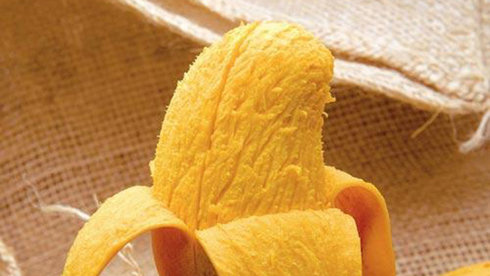Rumors of fake Chinese mangos made from plastic are throwing social media users in Vietnam into a collective paranoia.
The rumors sprouted from a video clip posted by a Facebook account named D.T.N. appearing to show the seed from a small mango, allegedly from China, being cut open to reveal what seems like a plastic membrane.
From there, the rumors quickly spun out of control as Facebook users liked, commented on, and shared the video clip. Some even recreated the original video, cutting up stones of mangos they bought themselves.
Rumors like these are common in Vietnam, where many food safety scandals have been exposed over the last few years and, though the viral video seems to have triggered an Internet frenzy, not everyone is ready to hop on the newest paranoia bandwagon.
“Do you think it’s easy to counterfeit a mango? Mangos sell for only ten thousand dong per kilogram. No one would be crazy enough to counterfeit every mango for the hundreds of tons of the fruits sold here. Do you know how much time and money it would take to fake that many mangos?” a Facebook user commented, pointing out the absurdity of the claim.
Others cautioned that the video might hurt mango sales for honest farmers and sellers.
“When you share false information, you’re ruining the livelihoods of other people,” another Facebook user commented.
Fact-checking the rumor
Ma Quang Trung, general director of the Department of Crop Production, asserted that the type of mango seen in the video clip is not from China, but is actually a Taiwanese species of mango grown in Vietnam.
According to statistics from the department, farmers in the southern provinces of Vietnam currently grow 6,000 hectares of this mango species.
The species is robust, resistant to disease and pests, and convenient for transportation.
“However, this species has not been carefully researched and has yet to be certified as safe for production in southern Vietnam,” Trung added.
According to many experts, the ‘plastic’ membrane found in the clip might just be a natural part of a mango.
Dr. Tran Anh Tuan, a member of the Plant Physiology Department of the Vietnam National University of Agriculture, said that many plants have soft membranes to protect the seed.
Dr. Nguyen Van Hoan, a former lecturer in the Faculty of Agronomy of the Vietnam National University of Agriculture, suggested that some plants have an outer coat to protect the seed and a very soft inner membrane that encapsulates the seed.
This soft membrane is perhaps the ‘plastic’ one people claim to have found inside the stones.
Who is to blame?
This is not the first time a rumor about food safety has caused paranoia in Vietnamese social media.
Previously, rumors of fake chicken eggs from China and rice paper wraps made from plastic have horrified consumers.
Though food safety rumors seem abundant, many have denounced the mango video and voiced concern that spreading rumors like this is an irrational and irresponsible act.
These unverified reports unnecessarily deepen the anxiety of consumers and hurt honest sellers and farmers whose livelihoods depend on the products accused of being unsafe.
On the other hand, however, concerns over food safety have become so deeply ingrained in the minds of Vietnamese consumers that they are conditioned to believe any rumor about unsafe food.
The events that initially planted those fears in the minds of consumers — dirty meat, fruits pumped with chemicals, fake coffee, vegetables full of pesticides — are all real.
Rumors like the one discussed in this article are only the tip of an iceberg pinpointing the lamentable state of food safety in Vietnam.
And who is responsible for solving these problems? Ultimately, the power lies in a place much higher and mightier than this humble newspaper.
























































